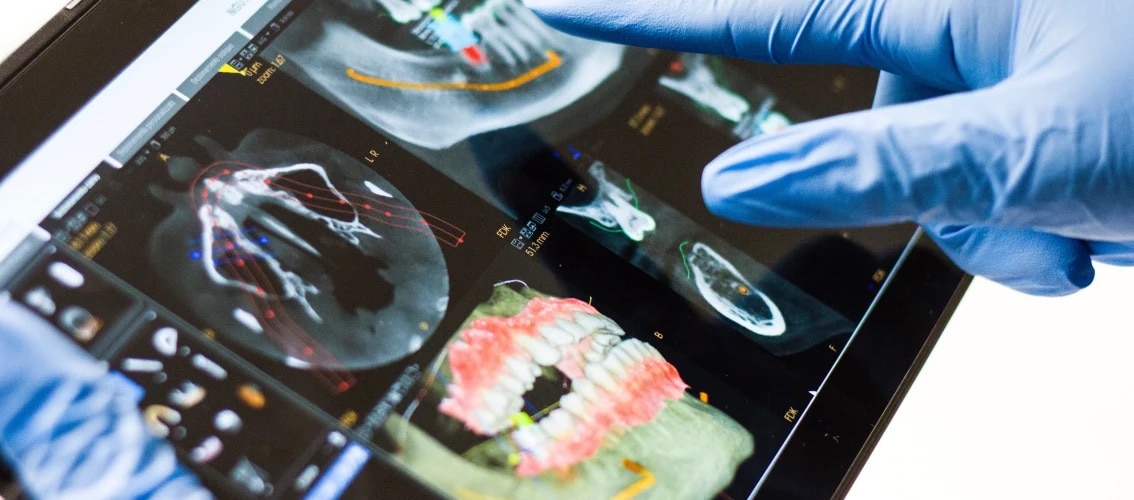Training may overlap, but there’s a difference between a dentist and a doctor.
The Difference Between a Dentist and a Physician
When a person says that they have a doctor’s appointment, they usually mean with an M.D. (medical doctor). But dentists are also doctors. A dentist is a doctor specializing in the field of oral health, diagnosing and treating diseases that affect the gums and teeth. They perform visual exams, diagnostic tests, and utilize x-rays as part of their practice, just like a physician does. In fact, a certain type of dentist, called an oral surgeon, performs surgery but their scope of expertise is limited to the mouth.
A physician, on the other hand, is trained how to study and treat the human body’s overall wellness and health. A general practitioner will know how the body works, how to treat it, and how one illness or injury can lead to another. That said, most physicians study to become experts on one specific part of the body, such as a chiropractor or ear, nose and throat doctor. In that way, a dentist is simply a doctor with a medical specialty of the mount. Dentists are trained to assess nerves and muscles in the head and neck, the jaw, the tongue, and the salivary glands. They can detect oral abnormalities that can be symptomatic of other diseases and illnesses and provide solutions. So what do you think, is a dentist a physician?
Is There a Difference in Training?
The curriculum and structure of medical school and dental school are similar. Both schools require a four-year rigorous study program beyond a bachelor’s degree. Medical school students and dentistry students are both required to take life sciences and pharmacology courses in the first two years of school. They both take ethics, law, and clinical practice classes. And, during the second half of both medical and dental school, students work and study directly with patients under the supervision of a doctor in their field. Upon graduating dental school, a dentist will receive either a DDS (Doctor of Dental Surgery) or a DMD (Doctor of Medical Dentists). While some dental schools award DDS degrees, and others give out DMD degrees, there’s no difference in study or in the licensing requirements that allow them to practice. Once they receive their degree, dentists must pass a licensing exam for the state where they will practice dentistry.
Upon graduating medical school, a physician will be given a MD or DO degree, or a specialized degree. Many physicians continue on to do a residency program, sometimes required and sometimes not. After that, the resident may choose to go on and do a fellowship. So as you can see, physicians do generally have more training than a dentist, but it is because if they want to specialize in something, they first have to know everything about the human body in general, and then their area of expertise. Dentists only need to study their area of expertise.
Is a Dentist a Physician?
That said, dentists have the option to pursue specialties as well. It’s not only physicians that continue with their education to graduate with special accolades. Here are a few examples of dentistry specialties:
- Pedodontics. This dentist specializes in children’s teeth
- Periodontics. A dentistry branch focused on gum disease and oral implants
- Endodontics. Ever had a root canal? That was an endodontist dentist
- Orthodontics. Dentists who correct teeth and jaw misalignments
- Prosthodontics. A branch of dentistry that specializes in dentures and oral prosthetics
- Oral surgery. Oral surgeons specialize in extracting, treating congenital disabilities, and treating oral diseases and injuries
While dental residencies typically require a two-year study period and supervised practice following dental school, an oral surgeon may require additional study and supervised practice between four and six years. Like dentists, a physician must pass a licensing exam in the state they wish to practice. However, unlike a dentist, a physician may not begin practicing immediately and must complete a post-doctoral program within an area of specialty. The training length will vary according to specialty. General practitioners, for example, require a residency of three years, while an OBGYN (women’s health or obstetrics-gynecology) will be required to complete a four-year residency. A neurosurgeon’s residency is seven years.
So is a Dentist a Physician, then?
Like how a routine physical at your physician’s office will monitor and help you maintain your body’s overall health, a regular dental exam at your dentist’s office monitors and supports your oral health. So many underlying medical issues have a solid link to oral health. That’s why dentists are often the first to spot early signs of severe diseases like diabetes. In addition, dentists perform surgeries and help prevent harmful health complications associated with oral infections and gum disease. While some will continue to debate whether a dentist should be considered a doctor, it is clear that titles like DMD and DDS go through similar rigorous training and are just as crucial to our health as those who carry the titles of MD and DO.
Dentist vs Physician FAQ
Let’s answer some common questions about whether a dentist is a physician and vice versa.
Do you address a dentist as doctor?
Yes. Just like you would address your medical doctor as, “Dr. Smith,” your dentist should be addressed as “Dr. Cohen.”
Why is dentistry not a medical specialty?
In the eyes of many, including insurance companies, dentistry is separate from the medical field, even though dentists are essentially doctors with different training. As a result, x-rays and preventative dental care are not typically covered under standard medical insurance plans and require a separate dental plan to cover oral care.
Why is the salary of a dentist?
According to ZipRecruiter, a dentist’s current average median salary is $173,598 per year, which translates to approximately $80 an hour.
Who makes more dentists or doctors?
In some areas of the country, dentists earn more than the average physician or medical doctor, according to a 2012 report in The Journal of the American Medical Association. Salaries for both dentists and doctors vary based on location, experience, education, and specialty practice.
Is being a dentist hard?
Obtaining a degree in dentistry is equally as challenging as becoming a doctor. From the competitive dental school application process and the length of school to tuition costs, setting up a practice, and paying for insurance, becoming a dentist isn’t easy. But based on average income, it is well worth it.

